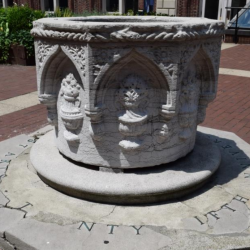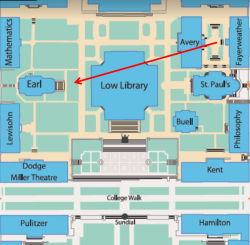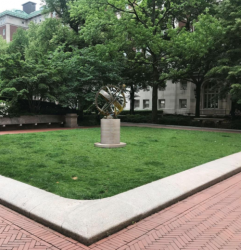As a wee freshman, Nadra Rahman may have signed the Henry Moore petition? She reports on part 2 (and more), straight from the Satow Room.
Last night’s CCSC meeting dredged up memories of art controversies past and also featured conversations about academic integrity, substance abuse, and the Dominican Stephen Colbert. Miraculously, they made it all the way through the agenda.
Truly, The Cycle Of Life
If you’re not a senior, maybe you don’t remember the Reclining Figure controversy, when over 1,200 people signed a petition to keep a Henry Moore statue off Butler’s lawn (the often bombastic Daniel Stone, a regular in CCSC recaps of old, was involved). To prevent a similar fracas, the Columbia Committee on Art Properties sent its lone undergraduate ambassador, Chris Zheng (CC ‘19) to alert the council about newly proposed installations.
The first proposal is to move the Venetian wellhead currently installed in between Avery and Fayerweather (you’ve seen it) (apparently a gift from the Class of 1887) to the lawn right in front of Earl. Because the lawn is surrounded by hedges, students will not lose accessible lawn space. The second is to install a Paul Manship sculpture called The Cycle of Life on the lawn right outside John Jay. The sculpture, donated long ago by an alum, features the signs of the zodiac, turtles, and humans, making it “a great place to talk about the eternal rejuvenation of youth outside John Jay hall.”
- Trash can or trash chic?
- The long journey of the Venetian
- Behold! The Circle of Life!
- Stumbling out from JJ’s at 3 am and you’re hit with this…
Zheng stressed that the Paul Manship sculpture would fit the aesthetics of lower campus (especially because they will not restore it to its original dazzling gold) and be relatively unobtrusive; Facilities has confirmed that they will put a protective coat around it during NSOP to prevent damage. Furthermore, the base of the sculpture can be used for sitting and leaning against, as long as no one climbs aboard. VP Finance Adam Resheff remained worried: “Is there a concern that a bunch of drunk students coming back at 3 am, think oh this would be fun to play with, and you know…” To this Zheng said that the sculpture is unlikely to be harmed unless someone takes a blowtorch to it. Also, there are funds for restoration.
As for the Venetian wellhead, the problem is that event set ups over the years have left the concrete base completely cracked. People also use it as a trash can. According to Gender and Sexuality Rep Kwolanne Felix, “it is confusable.”
Council did not express much resistance to the idea, especially after Zheng confirmed that installing the sculptures on upper campus would be “unfathomably expensive” due to the technical challenges posed by building a base on an elevated platform. After he meets with the other student councils, an informational campaign will alert the student body at large. If all goes well, the Venetian wellhead will be moved over Spring Break and the Paul Manship over the summer. Check out further specifics here.
Cite Your Sources
The meeting had actually begun with a Skype call from Victoria Brown, the Director of the Office of Academic Integrity. Brown is the first to hold her position and spoke to CCSC about the challenges of fostering a culture of academic integrity and honesty on campus, her desire to create engaging programming and workshops on the topic, and her request for help from CCSC in doing so. She emphasized the link between her work and student wellness (students often cheat because of stress and pressure) and the cross-departmental connections she is trying to build to address the issue.
Resheff expressed some skepticism around the idea. He agreed that academic integrity was an important issue, especially as a CS major—the department is rife with cheating. However, he felt that firstly “no one would come” to a ~fun~ workshop on academic integrity and secondly, more needed to be done to change an environment that fosters and rewards academic dishonesty. Speaking to curved STEM classes he said, “You hear about students getting tests from the TAs, entire cheating systems in the bathrooms, and it’s so frustrating because my grade is literally being affected.” In his opinion, fun programming doesn’t get at the root of the issue.
International Students Rep Joon Baek thought that specialized programming might be needed for international students, whose high schools may have had different expectations surrounding academic integrity. Brown agreed and said she was working on integrating a workshop during ISOP and finding other ways to reach international students. In response to him, she also described her role in the hearing process for academic dishonesty. Her key role is following up with students after their hearings to help them learn how not to repeat the same mistakes (by providing resources on time management, accessing the libraries, etc.).
USenator Alfredo Dominguez asked whether they could work with Brown to further conversations on academic programming and mental health, since the poor-mental-health-leads-to-academic-dishonesty angle may prove fruitful with administrators and faculty. Brown was receptive, stating this was part of the reason she had reached out to CCSC in the first place.
Bwog’s takeaway: don’t cheat if you’re in Adam Resheff’s class.
A Visit From The Recovery Coalition
GS students Chris Thompson (also the GSSC Health and Wellness Rep) and Peter Trevino spoke to CCSC as representatives of the Recovery Coalition, an unrecognized student group that provides a space for anyone who is in recovery from substance abuse or emotional or physical trauma to speak freely and share resources. The duo came to raise awareness of their group and to ask for CCSC’s help in reaching CC and SEAS students, as they may have particular issues. As Trevino pointed out, many young undergraduates grappling with substance abuse “can’t imagine how to stay away from those things and still be young.”
USenator Alfredo Dominguez raised the possibility of the group partnering with Greek organizations and other student groups where drinking plays a large part, while Disability Services Rep Aaron Liberman and 2021 Rep Aja Johnson said that freshman and transfer students may be especially important demographics to target.
Thompson and Trevino said that currently, they are building a relationship with (an “extremely supportive”) Columbia Health, and have received new members through referrals from Columbia’s system; they are also working on a website, achieving recognition, and figuring out a schedule for this semester. The group also sponsors an entirely separate weekly AA meeting on campus, the first to be held on campus in 5 years.
Money
CCSC also approved the disbursement of money from CC’s JCCC fund to the groups Grupo Quisqueyano (GQ) and Raas. JCCC provides funding to student groups for emergency expenses or travel, with each school contributing in proportion to the involvement of its students. The two groups needed to make their case to CCSC directly because the amounts they were requesting were too high for the JCCC committee to make the decision internally.
GQ, a group representing Dominican students and culture, was approved to receive $1765.94 to cover AV and tech costs for the National Dominican Student Conference, which will be hosted at Columbia from March 8-10. Representatives from the club said that the conference would touch upon Columbia’s “fraught relationship with the Dominican community” and feature the “Dominican Stephen Colbert.” Raas, a raas garba dance team that competes on the national circuit, requested and received $2754 to go towards travel costs for an upcoming competition.
In both cases, Resheff said that the requests fit JCCC’s spending guidelines and precedent and there was enough money in the JCCC pot to last the rest of the semester.
And that’s all! Recline away.


 0 Comments
0 Comments



